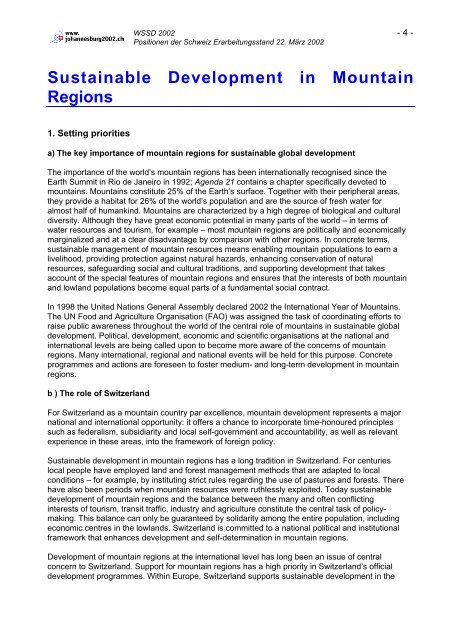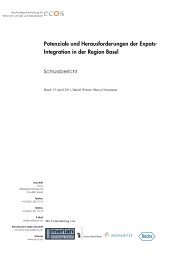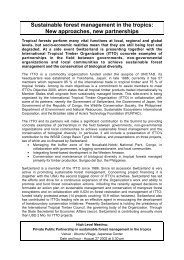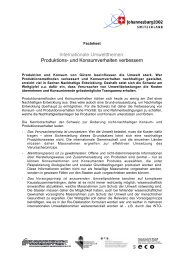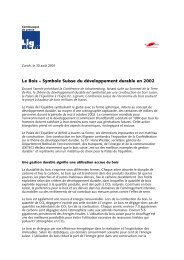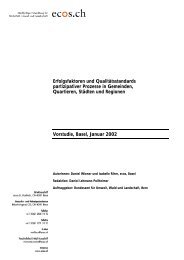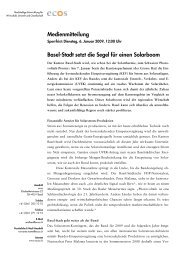Extract from the Position Paper
Extract from the Position Paper
Extract from the Position Paper
You also want an ePaper? Increase the reach of your titles
YUMPU automatically turns print PDFs into web optimized ePapers that Google loves.
WSSD 2002 - 5 -<strong>Position</strong>en der Schweiz Erarbeitungsstand 22. März 2002Alps as a signatory of <strong>the</strong> Alpine Convention. Therefore, sharing our own experience, cooperatingin adapting this experience to <strong>the</strong> needs of o<strong>the</strong>r mountain regions, and showing solidarity andengaging in partnership with mountain people throughout <strong>the</strong> world constitute an opportunity aswell as an international obligation.c) Mountain development as a key interface of sustainable developmentSustainable development in mountain regions is a pervasive issue. It touches on all <strong>the</strong> priorityareas to which Switzerland is committed in <strong>the</strong> framework of Rio+10, i.e. freshwater resources,international environmental issues – especially sustainable management of fragile ecosystems,global climate change, biodiversity, and sustainable forest management – poverty alleviation, andtrade-related issues, especially market access for marginal regions. O<strong>the</strong>r important issues arequestions of governance, especially decentralisation and subsidiarity, as well as <strong>the</strong> participation ofcivil society, <strong>the</strong> private sector and <strong>the</strong> scientific community in political decision-making processes.2. Political positions taken by Switzerland in support of sustainable development inmountain regionsa) Mountains – an environment for learning about and implementing principles ofsustainabilityNature has always played a dominant role in <strong>the</strong> mountains. Despite <strong>the</strong> advances of moderntechnology and civilisation, economic and social conditions are more directly affected by naturalphenomena in mountain regions than in any o<strong>the</strong>r environment, and people living in mountainregions are more intensely and immediately affected by natural conditions than people elsewhere.Switzerland <strong>the</strong>refore believes that sustainable development in mountain regions constitutes anarea of endeavour that is fundamental to learning about and implementing <strong>the</strong> principle ofsustainable development, which must give equal consideration to natural, social and economicconditions – <strong>the</strong> <strong>the</strong>e main components of sustainability. This will involve fostering integration ofdifferent sectors and policies and applying resulting concepts and approaches appropriately ino<strong>the</strong>r development contexts.b) Recognition of mountain regions as important, specific areas of developmentThe driving forces of mountain development are very often dominated by <strong>the</strong> interests of politicaland economic centres and densely populated urban centres; moreover, <strong>the</strong>se forces are usuallynot beholden to principles of sustainability. Hence if sustainable development is to be possible inmountain regions at all, <strong>the</strong> political status of <strong>the</strong> world’s mountain regions must be enhanced,especially at <strong>the</strong> national level.Switzerland is committed to national political frameworks that enable mountain regions to advocate<strong>the</strong>ir interests as equal partners, especially vis à vis centres of political and economic power.Federalism, decentralisation, subsidiarity, local self-government and accountability,acknowledgment of local rights to resources and targeted economic development are <strong>the</strong> coreconcepts in such frameworks. Ultimately, <strong>the</strong>se concepts must be concretely expressed in anational policy for mountain regions. Switzerland supports exchange and collaboration amongmountain regions within national borders as well as international cooperation among mountainregions, with <strong>the</strong> aim of enhancing <strong>the</strong> political significance of <strong>the</strong>se regions at <strong>the</strong> national andregional levels.c) Compensation for services rendered to surrounding areas
WSSD 2002 - 6 -<strong>Position</strong>en der Schweiz Erarbeitungsstand 22. März 2002Mountain resources with economic value are not only developed largely as <strong>the</strong> result of externalintervention and investment, but are also exploited primarily by external interests. In most cases,compensation for use of mountain resources is inadequate. The consequences for mountainregions are lack of capital, minimal economic power, widespread poverty, degradation of naturalresources and migration.Hence Switzerland is firmly committed to adequate compensation for services provided bymountain regions to surrounding areas. This includes <strong>the</strong> streng<strong>the</strong>ning of local rights of resourceuse; fair concessions for use of mountain resources such as drinking water, water used forirrigation and hydropower, mineral resources and timber; and promotion of forms of tourism thatallow for conservation of resources and foster local economic development. Compensation mustalso be provided where it is in <strong>the</strong> general public interest to refrain <strong>from</strong> resource use, e.g. in <strong>the</strong>case of establishing nature reserves. The overall aim is to ensure that adequate income is returnedto mountain areas as part of a comprehensive arrangement in which financial resources arebalanced within closely linked highland-lowland systems.In order to relieve pressure on mountain resources, Switzerland supports efforts to promotedevelopment that conserves resources in mountains and surrounding areas. At <strong>the</strong> domestic aswell as <strong>the</strong> international level, Switzerland advocates <strong>the</strong> polluter pays principle, according to whichthose who waste or degrade resources must bear <strong>the</strong> costs.d) Diversification and <strong>the</strong> benefits of complementaritiesMost of <strong>the</strong> world’s mountain regions are areas characterised by sensitive ecosystems with littlepotential for human use. The disadvantage of limited potential for use can be partly overcomethrough diversification of resource use in different altitudinal belts and climatic zones as well as indifferent sectors such as agriculture, pastoralism and forestry; through integration of business,industry and tourism; and through seasonal migration.Accordingly, Switzerland is carefully monitoring <strong>the</strong> impacts of current global trends such asglobalisation, promotion of economies of scale, specialisation and monofunctional use, andconcentration of public services, in light of possible threats to diversification and sustainabledevelopment of mountain regions. Switzerland thus supports diversified and multifunctional formsof agriculture. It <strong>the</strong>reby acknowledges <strong>the</strong> central role of agriculture in many of <strong>the</strong> world’smountains as a local source of food, employment, income and value-added production, as well as<strong>the</strong> key role played by agriculture in ensuring decentralised settlement and maintainingbiodiversity.To streng<strong>the</strong>n <strong>the</strong> economy in mountain region, Switzerland supports <strong>the</strong> development ofopportunities to generate local income in <strong>the</strong> business, industrial and service sectors (e.g. tourism).This involves exploiting complementarities with o<strong>the</strong>r economic areas, as well as targeted supportfor mountain-specific products and services – for example, through better-quality advice andimproved access to markets, quality labelling, or <strong>the</strong> use of new information technologies.Switzerland believes it is important to integrate <strong>the</strong> business community in mountain developmentmuch more closely than previously. To fur<strong>the</strong>r this objective, it supports development ofdecentralised infrastructure – especially with respect to land development (including roads, water,electricity, etc.), education, health care, and provision of financing and credits.e) Taking full advantage of local potential for innovationSwitzerland considers local potential for innovation a key prerequisite for sustainable developmentin mountain regions. This potential must be <strong>the</strong> focus of much more committed and specificsupport in future than until now. As a prerequisite for achieving this aim, Switzerland envisions <strong>the</strong>
WSSD 2002 - 7 -<strong>Position</strong>en der Schweiz Erarbeitungsstand 22. März 2002creation of a decentralised educational system, consisting of primary schools as well as vocationalschools and institutions of higher learning, which would focus far more than previously on <strong>the</strong>specific requirements and problems of respective mountain regions without neglectingdevelopment and interconnections at <strong>the</strong> global level. Close collaboration among business,government and educational institutions at all levels, as well as <strong>the</strong> creation of appropriate policyframeworks that include features such as credit on favourable terms and tax incentives forbusiness start-ups, will also play a decisive role in exploiting <strong>the</strong> potential for innovation.f) Cultural change without loss of identityPopulation pressure, resource scarcity and labour migration, and <strong>the</strong> global dominance of urbanvalues –transmitted by <strong>the</strong> mass media, educational systems, tourism and seasonal migration to<strong>the</strong> most remote corners of <strong>the</strong> globe – are responsible for rapid social and cultural change inmany of <strong>the</strong> world’s mountain regions. Major processes of global transformation are also takingplace in mountain regions; this is having a levelling effect on <strong>the</strong> richness and diversity of culturalheritage.Switzerland intends to counteract threatened loss of cultural heritage, <strong>the</strong> widespread threat ofcultural dissolution and loss of identity, and loss of local knowledge about resources, appropriateresource management and natural hazards. To this end it is making increased efforts to callattention to <strong>the</strong> value of local culture through education, <strong>the</strong> media – including new informationtechnologies such as <strong>the</strong> Internet – databanks, exhibitions and museums, as well as by fosteringnew forms of culture characterised by local ownership.g) Conservation of mountain ecosystems and early warning mechanismsOwing to <strong>the</strong>ir climatic diversity, mountain regions are biodiversity hotspots. In many places <strong>the</strong>sebiodiversity hotspots are endangered by internal and external pressure on resources and by <strong>the</strong>impacts of global climate change.Switzerland is contributing to efforts to maintain <strong>the</strong> biological potential of mountain regions to <strong>the</strong>greatest extent possible, both as a natural heritage and as a resource for possible future use. Itsupports efforts that are designed to achieve this in collaboration with local populations. In sodoing, Switzerland acknowledges that biodiversity is usually maintained ra<strong>the</strong>r than threatened byappropriate forms of resource use.Mountain regions are extreme habitats and with highly fragile ecosystems. As such, <strong>the</strong>y registerenvironmental degradation earlier and more clearly than less sensitive systems. Hence mountainregions serve as early warning systems for natural as well as anthropogenic forms ofenvironmental change such as global climate change (glaciers).Switzerland is working to ensure that this early warning function is maintained and used for <strong>the</strong>benefit of all humankind. Switzerland supports long-term monitoring programmes and awarenessraisingcampaigns for this purpose, and calls upon <strong>the</strong> international community to give specialattention to <strong>the</strong> preservation of fragile mountain ecosystems.h) Institutionalising <strong>the</strong> issue of sustainable development in mountain regions.Despite its crucial importance to <strong>the</strong> continued existence of humankind, <strong>the</strong> question ofdevelopment in mountain regions has not been firmly established as an international issue. TheInternational Year of Mountains 2002 offers a unique opportunity to anchor this issue more firmly at<strong>the</strong> international level.
WSSD 2002 - 9 -<strong>Position</strong>en der Schweiz Erarbeitungsstand 22. März 2002c) Political support, legislation and administrative instrumentsBasic political decisions and laws can provide frameworks that have a decisive influence infostering sustainable development in mountain regions.Switzerland supports political processes of negotiation as well as legal frameworks (such asnational policies on mountain regions or spatial development policies) and laws (e.g. to promoteinvestment) that would help to streng<strong>the</strong>n <strong>the</strong> political and economic power of mountain regions ina national context. Switzerland is also committed to adequate implementation, for instance byassisting in institution building to promote <strong>the</strong>se measures.Switzerland believes that <strong>the</strong> development and implementation of new forms of politicalparticipation at <strong>the</strong> community level are especially important. This should include decentralisation,transparency, and more active involvement by people at <strong>the</strong> local level.d) Institutional capacity, education and trainingInstitutional capacity and human capital are <strong>the</strong> core elements of development in resource-poorareas such as mountain regions.Switzerland continues to support institutions concerned with international mountain development(specific international and regional organisations, development cooperation projects, and mountainpartnerships in <strong>the</strong> framework of <strong>the</strong> National Centre of Competence in Research North-South and<strong>the</strong> Swiss National Research Programme on Landscape and Habitats in <strong>the</strong> Alps). Switzerlandalso calls upon o<strong>the</strong>r countries to become more active in supporting such institutions.Toge<strong>the</strong>r with like-minded partners, Switzerland strives to develop and support institutions in <strong>the</strong>mountains such as universities and vocational schools that engage in research, teaching andabove all implementation of innovations adapted to mountain regions. Support for boarding schoolsthat have an international reputation, such as those that have long existed in Switzerland, is afur<strong>the</strong>r option.e) Information systems and exchange of information on mountain issuesSwitzerland supports exchanges of information on mountain issues at <strong>the</strong> regional, national andinternational levels concerned with policy, administration and economic issues as well as scienceand technology. It encourages both institutions and individuals in <strong>the</strong>se areas to make <strong>the</strong>irexperience accessible and supports <strong>the</strong>m in <strong>the</strong>ir efforts to do this. Switzerland also supportsinstitutions that are capable of coordinating <strong>the</strong>se exchanges of experience and compiling globallycoordinated databanks on mountain-related topics, such as <strong>the</strong> glacier inventory which providesdata that give early warning about negative environmental trends at <strong>the</strong> global level.f) Involving <strong>the</strong> private sector in mountain developmentImportant stakeholders such as <strong>the</strong> business community (trade, industry, mining, hydroelectricity,mass tourism and additional services such as banking and credit services) are rarely if everrepresented in existing (international) networks concerned with mountain issues.Switzerland would welcome <strong>the</strong> opportunity to join like-minded partners at <strong>the</strong> international andregional levels in encouraging initiatives that are open to <strong>the</strong>se stakeholders, make <strong>the</strong>m aware ofmountain development issues, and mobilise <strong>the</strong>ir support. Local and regional business forums andcouncils such as a World Business Council for Sustainable Mountain Development, in which <strong>the</strong>tourist industry and o<strong>the</strong>r financially influential sectors of <strong>the</strong> business community could take part,


